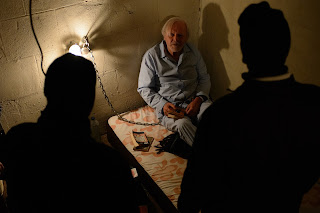Imagine the unpleasant hypothesis that you and / or your family are kidnapped, would you what to do If you are getting kidnapped and how to react?
Of course, each case is unique and depends on the context and the environment. Being abducted by a gang of criminals in an apocalyptic scenario would be different from a capture by a violent faction of political opponents acting for money.
However, there are some similarities in the behavior to be adopted, and so many things to consider, that we will study in more detail …
The aim of this two-part article (second part next week) is to give you some thoughts on what might happen.
The fact is that there really is no specific doctrine in this area. The following has therefore been adapted to situations that we civilian ourselves would be likely to experience in our world today, or in the one that would result from a scenario of chaos. One could find cases where the best solution would be just to stay attached and patiently wait for the help to arrive. This article is not intended for such cases, and will deal with those cases where it would be futile to await assistance from any body whatsoever.
After reading this article, I would personally advise you to go deeper into the subject, in particular the psychological aspect, through the biographies of people who have had unusual experiences in detention. Notably those of prisoners of war who survived the worst conditions, finally to make known to the world their incredible adventure. These stories include Louis Zamperini , a 30-year-old Olympic medalist who was captured by the Japanese during the last war after his bomber was shot down and derived more than one Months on the ocean.
You were captured … What to do now?
The first thing would be to anchor in your head that relief will not come. So much the better if someone comes to save you, but if not, one of the worst tortures you could inflict on yourself would be to start setting the dates for a possible rescue, The following Sunday or the end of the month, for example. After the deadlines, you would feel even more defeated and defeated than at first.
Do not play this game, and set yourself from the start a date for in 5 years from that of your capture. Then live the situation according to that. If you absolutely want to set yourself goals, then choose from productive ones, such as surviving until your next birthday. In doing so, You will feel each date that passes as a victory and not as a failure.
For this article, we will consider the assumption that we would have been removed for an indeterminate period. This could be due to:
- Someone trying to get a ransom. This is a real problem for anyone traveling the world or enjoying an envied position. As such, you should always make yourself known to your local embassy and leave your personal information as well as that of the family.
- A political reason (ask Solzhenitsyn), or religious (Christians in Muslim territory have a good experience on this).
- The takeover by a paramilitary or criminal group after a collapse of society.
- A repression of the government, specialty of the communist regimes such as Russia of Lenin and Stalin, the Khmer Rouge in Cambodia, and other dictatorships of the kind.
- A “commercial” motif. Like the whites removed by the Arabs on the French and Spanish coasts throughout the period of the Middle Ages. And the blacks at the same time.
- Anyone who wants to keep you prisoner in his cellar …
Unless you are part of a larger group that requires information about your kidnappers, and you have been specially trained and trained to do so, your task will be to:
- Stay alive
- Keep each member alive if you are in a group
- Gather as much information as possible from the time of your abduction to the time of your eventual release, which may be used later against your abductors
- Get away
Everything else is secondary and should serve these purposes. Your mission is not to massacre all those who have kidnapped you, unless it is the ONLY issue possible. Even in this case, this should only be the ultimate result. You’re not Rambo. Some of the information proposed in this article might be more or less appropriate depending on the situation, and it is important to estimate what can be expected before any action is taken. Remember that your loved ones or friends will probably try to save you, no matter what the context. The last thing to do is to work against them.

Reclaiming and keeping cool
It is more a mental game than anything else. If you are in a group, for example in family, your duty is to keep everyone as calm and lucid as possible. Do not try to utter negative or productive thoughts or words. Avoid as much as you can to complain, and especially to your kidnappers. Instead, make reasonable and sensible requests for an improvement in your conditions of detention.
Try to find laughable aspects in every thing. The policemen, professional soldiers and others know how to develop humor incomprehensible to civilians. It is one way of managing the situation. It is actually a natural way that the brain reacts, And we must not fight when the opportunity arises. Every day you can pass to laugh as an inmate is a good day .
If you are in a group, be sure to be tolerant towards your fellow sufferers, and that they themselves are tolerant towards others. Temperaments will turn out, and tantrums will break out. Work to keep things under control. You are a team now, whether you like it or not. Temperaments will turn out, and tantrums will break out. Work to keep things under control. You are a team now, whether you like it or not. Temperaments will turn out, and tantrums will break out. Work to keep things under control. You are a team now, whether you like it or not.
Celebrating Small Wins
The first 30 minutes after a kidnapping are the most dangerous, with those trying to escape. After these 30 minutes , you can feel happy and celebrate the event in your head. The first critical cape has passed. Every time you are moved to another place or you finish an interrogation, and you are still alive, it deserves another celebration. The smallest piece of information you will get to harvest about your abductors, what they say, the clothes they wear, what they do and when they do, is a small victory in itself.
Collect information
The first thing you need to do, from the first moment you realize that the day ahead is going to be a crappy day, is to start gathering information about the group that took you hostage. And this collection should not cease all the time of your captivity.
The military on the other side of the Atlantic use an acronym as a starting point for the basic information to be harvested from an enemy. Adapted to French, this would give something like TALITY:
- Size : How many are they? What is their strength?
- Activity : What do they do, what is their activity?
- Location : Where exactly are they? In which direction are they moving?
- Identification : Who are they? (From uniforms, marks, particular equipment or information given by the enemy itself)
- Time : On what date or time was the enemy seen?
- Equipments : How are your kidnappers dressed, what are their equipment (weapons and uniforms), with whom do they communicate, where do they live, what vehicles do they drive? Etc.
Information gathering is probably the most important thing to do during a kidnapping. Keep track of everything you can see. Practice your mind to remember everything. You will do it all the better because you will work there every moment. Just like awareness of the situation is something that you and your children can train right now.
After some time, you will guess patterns of behavior. With these patterns, you will be able to predict activities. By knowing who is doing what, when, and with what equipment, you will be able to detect breaches in the plans of your enemies.

Some good questions to ask
Here are various aspects to consider regarding your kidnappers, to keep your mind busy and not sink into depression or passivity:
- How much are really concerned about keeping me prisoner?
- What are their individual motivations (follow orders, fear of the leader, religious motivations, political …)
- What are the weaknesses of each one (does not like violence, not very attentive …)
- What are the schedules (changes of custody, meal times …) or routines?
- What equipment do they carry or are available to them?
- What is the layout of the premises where you are held prisoner? Which of the visible approaches?
- What are the minor details such as the opening direction of the doors of each room, the location of the handle, any openings, etc.
- The relationship between each of your kidnappers, especially friendships or oppositions
- Do they feel they have military training?
- How do they respond to your different attitudes such as capitulation or argument?
- What is their chain of command?
- Why did they take you away in particular?
- How did they plan and execute your kidnapping?
- What are their overall objectives?
- What is your value to them?
- What is the chain of command outside your kidnappers?
Try to collect as much as you can. Also try not to do it too obviously. It is not only a tactical necessity, it is a game; A mental game that you play against your kidnappers and that they should not be aware of. In other words, what can you learn from them without they discovering what you are doing?
Leave Clues
If you are moved from one place to another, leave some discrete clues in case someone is looking for you. Depending on the place and the circumstances, it could be the simple fact of dragging his feet on the ground, leaving traces on a window, on walls, paper, a vehicle, etc. Everything you could do to tell potential rescuers that they are on the right track.
Developing a routine
Developing a routine and sticking to it is a particularly important thing in abduction cases, as in any survival scenario in general. It would be too easy to sit and enjoy the trip, especially if your kidnappers brought you all the water and food you need. It is not by doing so that you would most likely improve your situation.
Establishing a program for each day will help you take control of the situation. Staying fit while exercising is one of the important things, to the extent that the conditions of detention would allow. Devote another part of the time to just sit down to reflect on a totally external aspect to the situation, Such as how you arrange your boat back home, is another. You need to act on your own terms. Once captured, you will not have the opportunity to control much. Whatever program you have established, even if it is just thinking in the head, it will always be a victory over your kidnappers and another way to keep your mind busy.

Establishing and developing reports
Try to be an “invisible man”. Do not stand out. Do not provoke your captors. Simply follow their orders; Observe, and do what you can to bear the daily life without helping your enemies. Remember that individuals placed in situations of extreme stress sometimes revert to primitive ways of thinking, where even visual contact can be perceived as hostile action.
The best way to collect information and improve your situation is to establish rapport with your kidnappers. Tell them your name, and if you have a family. You are not a prisoner of war from whom information is needed. If you are, then this should be handled very carefully. In case those who captured you are real professionals, they could use this information against you. But if you are not, then you will be able to use this information against them. You have to get them to get psychologically closer to you, and at the same time, collect information about what they are and how they work.
It is sort of the Stockholm Syndrome taken in reverse … They must see you as a person, and no longer as a prisoner. The reason why people give derogatory names to their enemies is to dehumanize them. That weighs less on their conscience. Do not let them do that.
Ask for small favors. As they begin to accept them, ask for larger ones,
Be aware of the psychological effects of abduction or hostage-taking
The Stockholm Syndrome mentioned above is something that must be realized. It is similar to that of battered women or other dysfunctional relationships for which there is an abundant literature. In summary, when someone has control of your life in a tense situation, you begin to identify yourself with that person – even project yourself through it – even if it is your enemy. The fear of an unknown situation can also make you prefer the one you live, even if it is not pleasant. You need to be aware of changes in your feelings or reactions to your kidnappers, or even your potential prisoner comrades.
Sometimes your kidnappers will change the rules, just to get you to do something else, Banned or “evil”, in the same way that sergeants of military schools act with the aim of breaking the will of young recruits. Be aware.
Being able to recognize such maneuvers is a great victory in itself and can help you beat them at their own game. At other times, they may deprive you of food and water, with the primary purpose of weakening you – And thus limit your chances of success in case of escape – but also to mark you psychologically and diminish your ability to resist and your reactivity.
Beware of surveillance or false flag attempts. Depending on the capabilities of your kidnappers, these could trap your room, set up cameras,

Stay out of the way and follow directions
If you hear or see a rescue crew arrive, do what you can to stay out of the way and follow the orders. Let them know that you are not a threat. DO NOT try to help them.
Unless your rescuers know you personally – and they recognize you in the midst of the crap they are about to enter – you are at this point an additional threat. Expect to be treated as such even after your rescue, until you can justify yourself.
Trying to get away
Trying to escape is the most dangerous thing you can do. Unless they have no hope of being rescued, or being sure they can not survive by staying, it is better to collaborate and continue to gather information. There is no question here of systematically discouraging escape, but of emphasizing that it is something that needs to be thought out – or whether it is grasped at the moment whether a real opportunity presents itself.
Be aware that if you try to escape, it will probably be for the last time , since your captors will increase their vigilance to prevent any further attempts. In any case, if you were to do so, It should be as soon as possible after being kidnapped – for example during the journey to your place of detention.
You should also consider what might happen to those you would leave behind, or that would be captured as you try to escape.
It is very likely that you are frequently moved. This gives you some benefits. Indeed, it is extremely difficult to monitor hostages or victims of kidnapping while on the move. Very often, this will be the right time for an escape, as are the very first moments following an abduction. Regardless of this, have a carefully thought out plan . If you are in a group, make sure that those who are with you know the details and the part that is theirs. If you decide to try your luck, you will probably have only one opportunity.
If you are captured again, all you have to do is start all over again as on the first day … But above all, keep hope. Keep your humanity and your dignity. Stay confident that you will go through the ordeal. The battle of your kidnapping is played out in your head; You are the only person who knows the terrain. Whatever you may be able to live, others like Moreau and our prisoners of Indochina have lived before you, for years, and under conditions you can not even imagine inhumanity …
To start all over again as on the first day … But above all, keep hope. Keep your humanity and your dignity. Stay confident that you will go through the ordeal. The battle of your kidnapping is played out in your head; You are the only person who knows the terrain. Whatever you may be able to live, others like Moreau and our prisoners of Indochina have lived before you, for years, and under conditions you can not even imagine inhumanity … To start all over again as on the first day …
But above all, keep hope. Keep your humanity and your dignity. Stay confident that you will go through the ordeal. The battle of your kidnapping is played out in your head; You are the only person who knows the terrain. Whatever you may be able to live, others like Moreau and our prisoners of Indochina have lived before you, for years, and under conditions you can not even imagine inhumanity …
